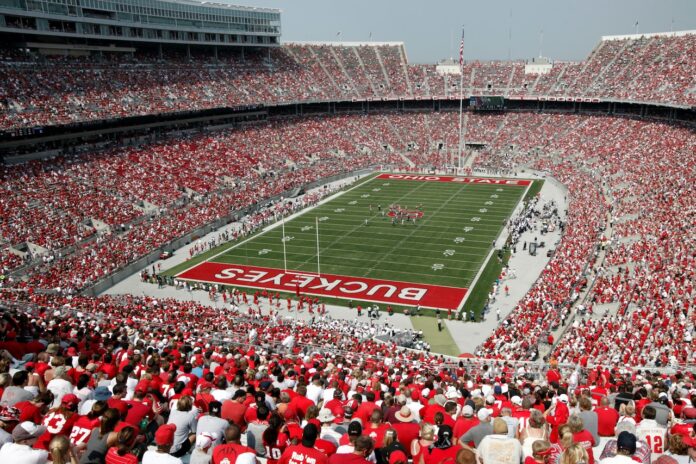
COLUMBUS, Ohio—More than three years after Ohio began allowing college athletes to profit off their name, image and likeness, two Republican lawmakers are looking to set new ground rules, including allowing schools to directly negotiate compensation deals with players.
Under House Bill 660, introduced last week, no state university or private college would be allowed to prevent student-athletes from being paid for their name, image, or likeness, nor for hiring an agent to negotiate such deals. Schools, in turn, couldn’t be punished by the NCAA for allowing players to get paid for their name, image or likeness (a term usually abbreviated to NIL).
Athletes and schools would be allowed to file civil lawsuits if they feel they’re being blocked from such deals.
Universities and colleges would be allowed to either directly compensate players for use of their name, image or likeness, or the schools could provide money and other help to NIL collectives, independent nonprofits that raise money to pay student-athletes. However, the bill states that no such compensation could come from student fees. Under the current system, NIL deals are negotiated with independent nonprofits affiliated with each school.
HB660 would also allow colleges and universities in Ohio to prevent their players from NIL deals involving tobacco, marijuana, alcohol, or vaping products, as well as adult entertainment or gambling. Players would be forbidden to use their school’s facilities, equipment, uniform or apparel in ads, and they couldn’t enter into a deal to advertise a product during official team activities.
The NCAA prohibited college players from profiting from their NIL for more than a century, arguing that its ban balanced academics with athletics, ensured competitiveness between schools, and prevented young athletes from being exploited.
However, a 2021 U.S. Supreme Court ruling lifting an NCAA ban on education-related benefits to athletes, such as computers and internships, led several states to pass laws allowing NIL deals. Gov. Mike DeWine signed an executive order that same year opening the door for NIL agreements in Ohio, arguing that it was needed to ensure Ohio schools wouldn’t lose out on top recruits.
Since then, schools such as Ohio State University, the University of Cincinnati, and Ohio University have set up NIL foundations. Ohio State football players were paid about $20 million in NIL money last year, athletic director Ross Bjork told Yahoo Sports in July.
State Reps. Adam Mathews of Lebanon and Jay Edwards of Athens County, the sponsors of HB660, said in a news conference late last month that the practice of NIL deals should no longer be in a “legal gray area” in Ohio – both to make sure student-athletes aren’t put in a trap, and to streamline Ohio schools’ ability to recruit top athletes.
“Whether you allow NIL or don’t like NIL … it’s here to stay,” said Edwards, who attended Ohio University on a football scholarship.
However, state lawmakers are only set to convene a few more times after the November election, and it remains to be seen whether HB660 will be taken up before the current legislative session ends.
Bills introduced this late in a legislative session as HB660 usually don’t pass – at least, not unless they are re-introduced during the next session.
Jeremy Pelzer covers state politics and policy for Cleveland.com and The Plain Dealer.
